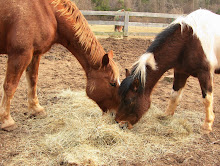I came across this and couldn't help but think of a friend who lost her horse to colic several months ago. I hope this helps.
Amplify’d from www.adventuresinanimalcommunication.blogspot.com
Wednesday, December 1, 2010
Colic
I have wanted to write a post about colic for a long time, but have been spending time in thought a prayer trying to gather my thoughts and knowledge about it.
What do I know about colic?
I know it has haunted me, as I have lost three of my own horses from it, and been present for many more who crossed over to the other side from it.
I know it is devastating to our domestic horses: One vet states that 85% of horses she has euthanized are from colics. 85%! (And only 15% of colics are fatal, thus multiplying the number of colics she sees)
I know that colic fits all the definitions of a trauma: An unexpected event in which we feel helpless and someone we love it at risk for their life. I have experienced this trauma in my own life and known the lingering effects of traumatic stress and traumatic grief.
I know about colic now that many of our beliefs about it aren't true. We are told colic is from a physical cause. However, in the case of each of my three horses, there was no obvious physical cause. No change of hay or grain, no shortage of water or turn out, no excessive stress from trailering or shows, nothing. Looking for a physical cause (or what I did wrong) for the colics of these horses just about drove me crazy.
On the flip side, many of the physical causes we do attribute colic very often do not lead to it. We all hear that moldy hay causes colic, but I have worked for people who threw entire bales of moldy hay to horses without a single case of colic. We all know that a shortage of water causes impaction, but I have seen rescue cases where the horses had no water but still food, and still no colics.
I am being lead to believe more and more that colic, while appearing in the physical, has, as its root, not a physical cause.
Did horses colic before they were linked to people? Do mustangs colic in the wild?
I still have many more questions about colic. Through my questing about it, the horses have lead me to believe that colic is a message from them. How is it possible that 85% of our domestic horses die from a digestive problem when we are so careful to care for their digestive tracts? Why did I lose three horses in a row to colics, when I was doing everything "right"?
The horses have told me that colic is a communication from them. It is an attempt to get our human lives back on track. Colic is like other "dis-eases"--a demonstration of the horses (and our own) "dis-ease" about our life courses reflected back at us.
I know from equine therapy that the horses present a perfect reflection back to us. How can I look at my horse colicking, then, and not be willing to examine myself for the "dis-ease"?
Am I saying that we are responsible for our horses' deaths through colics?
No, I don't believe so. I believe life and death to be sacred, and only God is in control of this realm. I don't believe we humans have the power to "cause" a death in any case other than murder.
However, I do believe that when a horse chooses this route to exit, it is giving us a strong, clear message that we need to look into. What is this reflecting in me? Where is my "dis-ease"? Where have I gotten of course?
And as we look at the huge number of horses who chose this route to cross-over, we need to be asking as a whole, "What are the horses trying to tell us as a human species? Why are they choosing this route to cross-over?"
I used to believe that horse colicked because they had been made in an imperfect design and had weak digestive systems. Having recently examined that, I realize this couldn't be further from the truth. Horses were made in perfect design--they were not designed to colic. Furthermore, I have been witness to the powerful strength and resilience of horses to survive through horrible adversity.
Colic is not a result of weakness or poor design. It is not a result of imperfect hay or grain.
It is a result of horses and humans coming together, and humans not heeding the message of the horse.
I don't pretend to know the full answer about colic, but I know considering on this has set me on a path to further find out.
Namaste,
Christy
See this Amp at http://amplify.com/u/bqh09







